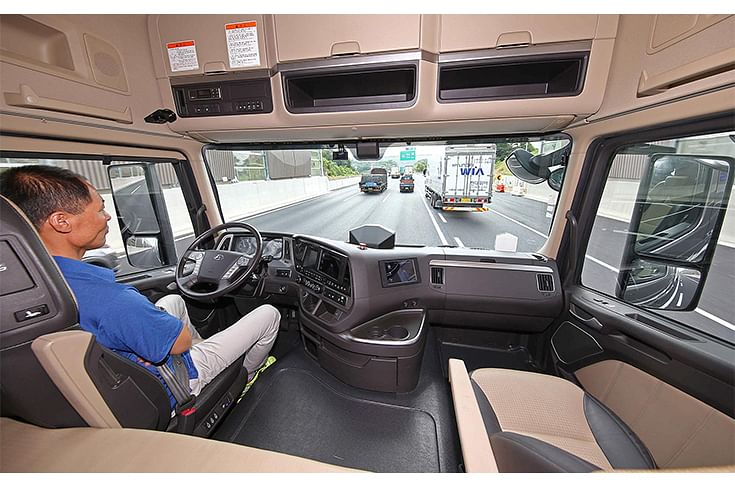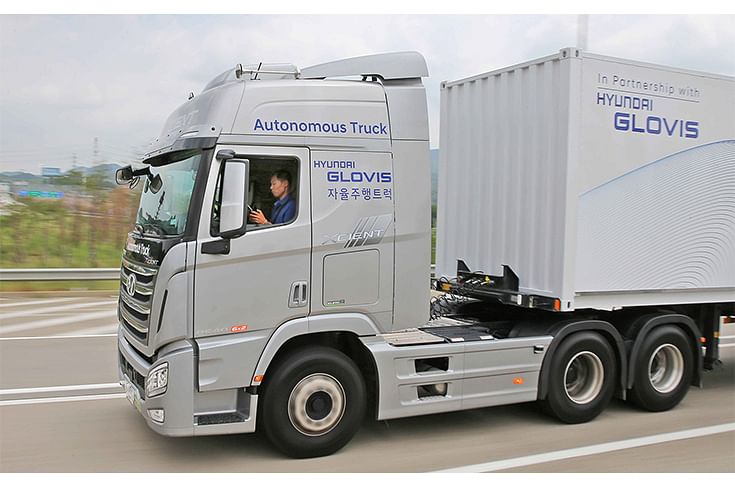Hyundai Motor demonstrates level 3 autonomous truck driving technology
Autonomous navigation of heavy duty trucks is expected to reduce road accidents due to human error.
Hyundai Motor company recently demonstrated level 3 autonomous truck driving technology by autonomously navigating a semi-trailer truck across a 40 km highway in South Korea.
The demonstration was conducted using Hyundai’s Xcient model truck, which has a maximum load capacity of 40 tons. This was semi-equipped with a Society of Automotive Engineers (SAE) standard Level 3 autonomous driving system, enabling it to steer, accelerate or decelerate, and manoeuver through traffic, all without human input. A human driver was on-board to take over manual control when required. During the demonstration, the vehicle changed lanes during the natural flow of traffic, detected lane changes made by vehicles in front of it, navigated through tunnels, and performed a complete halt or acceleration according to the road traffic.
Maik Ziegler, director of commercial vehicle R&D strategy group at Hyundai Motor company said, “This successful demonstration proves that innovative autonomous driving technology can be used to transform the trade logistics industry. At this stage, a human driver is still used to control the vehicle manually in certain situations, but I think we will achieve level 4 automation soon as we are constantly upgrading our technological capability.”
 Another notable landmark is that the Ministry of Land, Infrastructure and Transport (MOLIT) of South Korea issued a temporary autonomous driving license for the first time to a heavy-duty truck. Hyundai Motor, in cooperation with its trade subsidiary Hyundai Glovis, utilised this opportunity to test the application of autonomous driving for use in the trade logistics industry.
Another notable landmark is that the Ministry of Land, Infrastructure and Transport (MOLIT) of South Korea issued a temporary autonomous driving license for the first time to a heavy-duty truck. Hyundai Motor, in cooperation with its trade subsidiary Hyundai Glovis, utilised this opportunity to test the application of autonomous driving for use in the trade logistics industry.
Sang-Sok Suh, head of strategy and planning group at Hyundai Glovis said, “Hyundai Glovis’ success in utilising self-driving trucks as part of its delivery service proves that the self-driving technology is being utilised in actual logistics transport and can lead to mutual development. The company will be a leader in adopting future mobility technology like autonomous driving for the trade logistics industry.”
Special equipment for the special task
The semi-trailer truck is approximately 3.5 times longer, 1.4 times wider, and 9.2 times heavier than the average compact sedan, when comparing to an empty truck’s weight. This requires an advanced and detailed autonomous navigation system. Accordingly, Hyundai Motor equipped sensors similar to the ones featured in autonomous sedans, and additional sensors optimised for heavy-duty trucks, like a hitch angle sensor and trailer rear radar sensor. The equipment list consisted of 10 different sensors, including 3 front and side-rear cameras, 2 frontal and rear radars, 3 Lidars in the front and sides, and a hitch angle sensor in the trailer coupler which computes the change in angle between the truck and trailer in real-time, allowing the truck to be safely stabilised upon sharp turns.
 The data collected by each sensor collaborates with the HD map and sends information to the electronic control module for localisation, which then makes decisions for each situation, controlling the speed, steering, and braking accordingly. A new steering control system (MAHS : Motor Assist Hydraulic Steering) developed by Hyundai Mobis was also implemented to minimise the effort required to steer the vehicle, thus reducing driver fatigue.
The data collected by each sensor collaborates with the HD map and sends information to the electronic control module for localisation, which then makes decisions for each situation, controlling the speed, steering, and braking accordingly. A new steering control system (MAHS : Motor Assist Hydraulic Steering) developed by Hyundai Mobis was also implemented to minimise the effort required to steer the vehicle, thus reducing driver fatigue.
Driving the future autonomously
Autonomous trucks maximise efficiency by maintaining the most efficient speed and velocity, reducing fuel costs, which makes up about one-third of long-distance delivery costs and thereby lowering the vehicles’ carbon footprint. Hyundai is currently investing in truck platooning technology (multiple trucks travel in a convoy behind a lead vehicle) that will enable this process to continue with autonomous vehicles, which it plans to complete by 2020s.
Hyundai Motor is planning to undertake further autonomous navigation technology tests in future in a variety of areas like Busan and plans to concentrate on its enterprise development capabilities with the aim of early commercialisation of the technology.
RELATED ARTICLES
Autoliv Plans JV for Advanced Safety Electronics With China’s HSAE
The new joint venture, which is to be located strategically near Shanghai and close to several existing Autoliv sites in...
JLR to Restart Production Over a Month After September Hacking
Manufacturing operations at the Tata Group-owned British luxury car and SUV manufacturer were shut down following a cybe...
BYD UK Sales Jump 880% in September to 11,271 units
Sales record sets the UK apart as the largest international market for BYD outside of China for the first time. The Seal...






 By Autocar Professional Bureau
By Autocar Professional Bureau
 23 Aug 2018
23 Aug 2018
 10947 Views
10947 Views





 Ajit Dalvi
Ajit Dalvi




